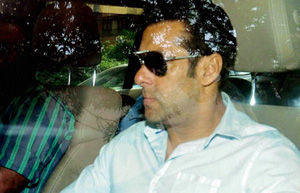New Delhi, May 6: Born with a silver spoon in his mouth, Salman Khan, 49, the eldest son of writer Salim Khan, has had an easy ride into Bollywood.
Though he made his acting debut as a supporting actor in the 1988 film "Biwi Ho To Aisi", it was his charming boyish looks in the 1989 film "Maine Pyar Kiya" that helped catapult him to fame at the age of 25, and give him a strong female fan base.
From playing a lover boy to crusader for justice, the superstar has charmed many and hit the jackpot numerous times with films like "Kick", "Dabangg" and "Ek Tha Tiger" in his almost three-decade-long career. The fact that his brothers produced some of his films helped.
But it was his run-in with the law that raised his notoriety quotient.
The Bollywood sweetheart has got a two-day relief on his way to jail, having been sentenced to five years in prison by a sessions court in Mumbai. The 2002 accident had resulted in the death of one person and injury to four others.
The actor is also facing trial for hunting a black buck, a protected species, during the shooting of "Hum Saath Saath Hain" in 1998. Two parallel cases are running against him - one under the Wildlife Act and the other under the Arms Act.
Even as the actor landed in legal trouble, he was busy giving box office hits.
Earlier, on his way to superstardom, he didn't mind sharing screen space with other leading actors of his era - Sanjay Dutt in "Saajan" (1991), Aamir Khan in "Andaz Apna Apna" (1994) - a box office failure, which years later became a cult film for its humorous dialogues - and Shah Rukh Khan in "Karan Arjun" (1995).
The stepson of yesteryear's dancing diva Helen, Salman featured in his star brothers Sohail and Arbaaz's film productions like "Pyaar Kiya To Darna Kya", "Main Aurr Mrs Khanna" and "Dabangg".
The "Biwi No. 1" star might have commenced his acting journey as a man all women would love to be with, but in recent years he started creating a name for himself in the action genre by starring in movies like "Wanted", "Ready", "Bodyguard" and "Kick".
He even entertained the masses as a host of TV shows like "Bigg Boss" and "10 Ka Dum". Though the latter didn't click with the audience, "Bigg Boss" - a controversial reality show that has completed eight seasons - has been one of the reasons why even non-couch potatoes chose to stick to the small screen.
Fondly called "Sallu bhai" by many, he is also known for launching the careers of actresses like Daisy Shah, Sneha Ullal and Zarine Khan and composers such as Himesh Reshammiya and Sajid-Wajid.
A lot of actors have also gone on record to say they are indebted to Salman. He has been an inspiration to many, especially when it comes to imitating his 'six-pack abs', including actors like Hrithik Roshan and Arjun Kapoor, who did away with their weighty issues, thanks to Salman.
In fact, Arjun also featured in the popular song "Superman...Salman ka fan" from "Tevar" film.
Salman also runs a Being Human Foundation, which supports underprivileged people in India. Started in 2007 in partnership with various companies, the foundation takes initiatives in the field of education and healthcare.
With over Rs.200 crore riding on him, his die-hard fans across the globe may only be eagerly waiting for his films - "Bajrangi Bhaijaan" and "Prem Ratan Dhan Payo" - to hit the screens. The infamy associated with his sentencing may even add to the popularity of the films.





Comments
Add new comment